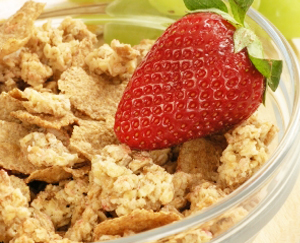Penn Herb Wellness Guide
Plant “Fats”: A Simple Way to Lower Cholesterol

How do they work?
Plant sterols and stanols are structurally similar to cholesterol and have been studied extensively for their cholesterol-lowering ability. Plant sterols and stanols seem to lower cholesterol by competing with it for absorption and by increasing the amount of cholesterol that is eliminated from the body.
Plant sterols and stanols appear to work best when eaten as part of a meal. For this reason, they’re frequently added to cooking oils, margarine-type spreads, dairy products, orange juice, and salad dressings, as a convenient way to get them into the diet.
But combining plant sterols and stanols with food means that these foods need to be eaten every day in order to reap the cholesterol-lowering benefits.
Supp it up
Researchers wanted to see if taking a plant sterol and stanol supplement might also help reduce cholesterol levels and triglyceride levels.
For six weeks, 32 people with high cholesterol (average age 58 years)took 1.8 grams per day of a plant sterol-stanol supplement or placebo. At the end of that time, the groups were switched, so that the placebo group then received the sterol/stanol supplement and vice versa.
After taking the plant sterol-stanol supplement, total cholesterol, LDL (“bad”) cholesterol, and non-HDL cholesterol (total cholesterol minus the heart-healthy HDL cholesterol) were significantly lower compared with placebo. HDL (“good”) cholesterol and triglycerides didn’t differ between the two treatment periods.
“The use of plant sterols and stanols in capsules or tablets offers a practical option compared to traditional food vehicles by virtue of being easily incorporated into a cholesterol-lowering regimen without altering the macronutrient distribution,” says lead study author, Kevin Maki, of Provident Clinical Research, the company that manufactures the supplement. “This feature might increase compliance during long-term use compared with the types of dietary changes needed to incorporate plant sterol/stanol foods.”
Eat your way to lower cholesterol
More studies are needed to confirm these positive results. And if you want to beat high cholesterol the old fashioned way—by eating well and exercising regularly—remember to include plenty of these proven winners:
Nuts: It’s not easy for a food to earn the right to bear a health claim, but nuts have done it. As part of a healthy diet, many types of nuts (including walnuts, almonds, hazelnuts, and pecans) may lower the risk of heart disease. So switch out the potato chips for a handful of nuts. Packed with protein, fiber, and healthy fats, nuts make a satisfying and nutritious snack that can lower your cholesterol, too.
Oats: Diets that are high in soluble fiber from foods like oatmeal can help lower cholesterol. For added benefit, add some chopped apples or strawberries and a sprinkling of nuts.
Olive oil: Olive oil may help lower LDL cholesterol levels and reduce heart disease risk. Be sure to choose extra-virgin olive oils. The less processed an oil is, the greater its anti-inflammatory action in the body.
(Int J Food Sci Nutr 2012;doi:10.3109/09637486.2011.636345)
Copyright 2025 TraceGains, Inc. All rights reserved.


